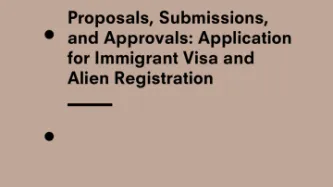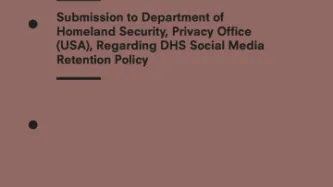Search
Content type: News & Analysis
We’ve been asked a lot lately about whether it is safe to travel, particularly to the US. And it’s not surprising why: the US Government is increasing their cruelty at borders.Border management today is fueled by our data, but government officials want more. They want as much data as they can get to catch you out. They’ve reportedly detained or deported people based on their free speech activities, denying entry on tenuous grounds like having the wrong photos on phones (including in in the ‘…
Content type: Examples
After the January 6 insurrection at the US Capitol, the Department of Homeland Security expanded its monitoring of online activity and set up a new intelligence branch to counter domestic terrorism, including tracking platforms that have been linked to threats and “narratives known to provoke violence”. The agency warned law enforcement partners when appropriate when it saw upticks in activity on platforms linked to white supremacists and neo-Nazis. The Brennan Center for Justice warns in a new…
Content type: Examples
According to internal documents obtained by the Brennan Center, the Polish “strategic communications” specialist Edge NPD, whose business is helping companies with market research, provided the Los Angeles Police Department with a free 40-day trial in which it collected nearly 2 million tweets, including thousands relating to six topics, including Black Lives Matter and “defund the police”. LAPD did not ultimately enter into a contract with the company; the documents do not say what the agency…
Content type: Examples
Despite having promised in 2016 not to facilitate domestic surveillance, the AI startup Dataminr used its firehose access to Twitter to alert law enforcement to social media posts with the latest whereabouts and actions of demonstrators involved in the protests following the killing of George Floyd. Dataminr's investors include the CIA and, previously, Twitter itself. Twitter's terms of service ban software developers from tracking or monitoring protest events. Some alerts were sourced from…
Content type: Examples
During the Black Lives Matter protests of summer 2020, US police took advantage of a lack of regulation and new technologies to expand the scope of people and platforms they monitor; details typically emerge through lawsuits, public records disclosures, and stories released by police department PR as crime prevention successes. A report from the Brennan Center for Justice highlights New York Police Department threats to privacy, freedom of expression, and due process and the use of a predator…
Content type: Examples
The consumer and market trends insight company StatSocial announced Crisis Insights, which it claims tracks rapidly changing consumer audience dynamics to help US brands and CMOs respond effectively to the ongoing coronavirus epidemic and economic slowdown. StatSocial's Silhouette social data platform monitors and analyses more than 1.3 billion social accounts covering more than 70% of US households. Crisis Insights is intended to identify the changing dynamics of customers and consumers who…
Content type: Examples
The US Department of Homeland Security awarded a $113 million contract to General Dynamics to carry out the Visa Lifecycle Vetting Initiative (VLVI), a renamed version of the Extreme Vetting Initiative and part of a larger effort called the National Vetting Enterprise. In May 2018, public outrage led the DHS to back away from a machine learning system that would monitor immigrants continuously; however, the reason it gave was that the technology to automate vetting did not yet exist. These…
Content type: Advocacy
Privacy International has today sent letters to leading social media platforms to ask what they're doing to protect their users' from dangerous surveillance by government immigration authorities.
The letter comes following the implementation of plans by US authorities to require nearly all visa applicants to hand over identifiers of all social media accounts they have used in the previous five years, or face “serious immigration consequences”.
The move not only represents…
Content type: Examples
In May 2018, US Immigration and Customs Enforcement abandoned the development of machine learning software intended to mine Facebook, Twitter, and the open Internet to identify terrorists. The software, announced in the summer of 2017, had been a key element of president Donald Trump's "extreme vetting" programme and expected to flag at least 10,000 people a year for investigation. ICE decided instead to opt for a contractor who could provide training, management, and human personnel to do the…
Content type: Advocacy
Social media, which can include a wide range of online platforms and applications, can be revealing and sensitive, making any collection or retention highly invasive. The effect would be unjustified intrusion into the private lives of those affected, undermining their freedom of speech and affecting everyone in their networks, including US citizens.
By normalising the practice internationally, other state authorities may reciprocate by demanding social media handles of US citizens,…
Content type: Examples
In 2016, the American Civil Liberties Union of Northern California published a report revealing that the social media monitoring service Geofeedia had suggested it could help police track protesters. The report's publication led Twitter and Facebook to restrict Geofeedia's access to their bulk data. ACLUNC argued that even though the data is public, using it for police surveillance is an invasion of privacy. Police are not legally required to get a warrant before searching public data; however…
Content type: Examples
Documents submitted as part of a 2015 US National Labor Relations Board investigation show that Walmart, long known to be hostile to unions, spied on and retaliated against a group of employees who sought higher wages, more full-time jobs, and predictable schedules. In combating the group, who called themselves the Organization United for Respect at Walmart (OUR Walmart), Walmart hired an intelligence-gathering service from Lockheed Martin, contacted the FBI, and set up an internal Delta team…
Content type: Advocacy
Privacy International wishes to raise serious concerns regarding the proposal to expand immigration records to include social media handles, associated identifiable information and search results. Specifically, in relation to the current request for comments Docket Number DHS 2017 0038, we object to the Department for Homeland Security proposal to update record source categories to include “publicly available information obtained from the internet”, “commercial data providers” and from “…
Content type: Advocacy
Privacy International has today submitted comments to a U.S. government consultation on whether the US Department of Homeland Security (DHS) should keep the social media details of individuals travelling to the US in so-called “Alien Files” documenting all immigrants.
We’ve urged that they don’t, and that they review and stop all similar social media surveillance by the DHS.
The systematic surveillance of social media is an increasingly dangerous trend …
Content type: Long Read
Disclaimer: This piece was written in April 2017. Since publishing, further information has come out about Cambridge Analytica and the company's involvement in elections.
Recently, the data mining firm Cambridge Analytica has been the centre of tons of debate around the use of profiling and micro-targeting in political elections. We’ve written this analysis to explain what it all means, and the consequences of becoming predictable to companies and political campaigns.
What does…








